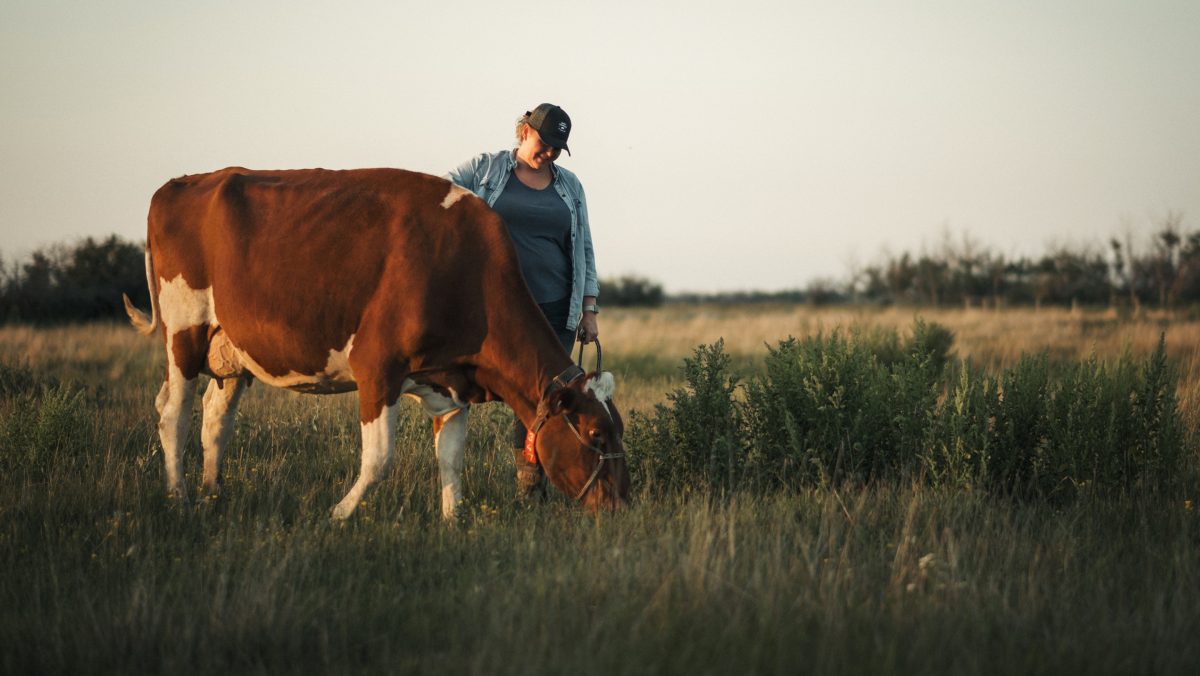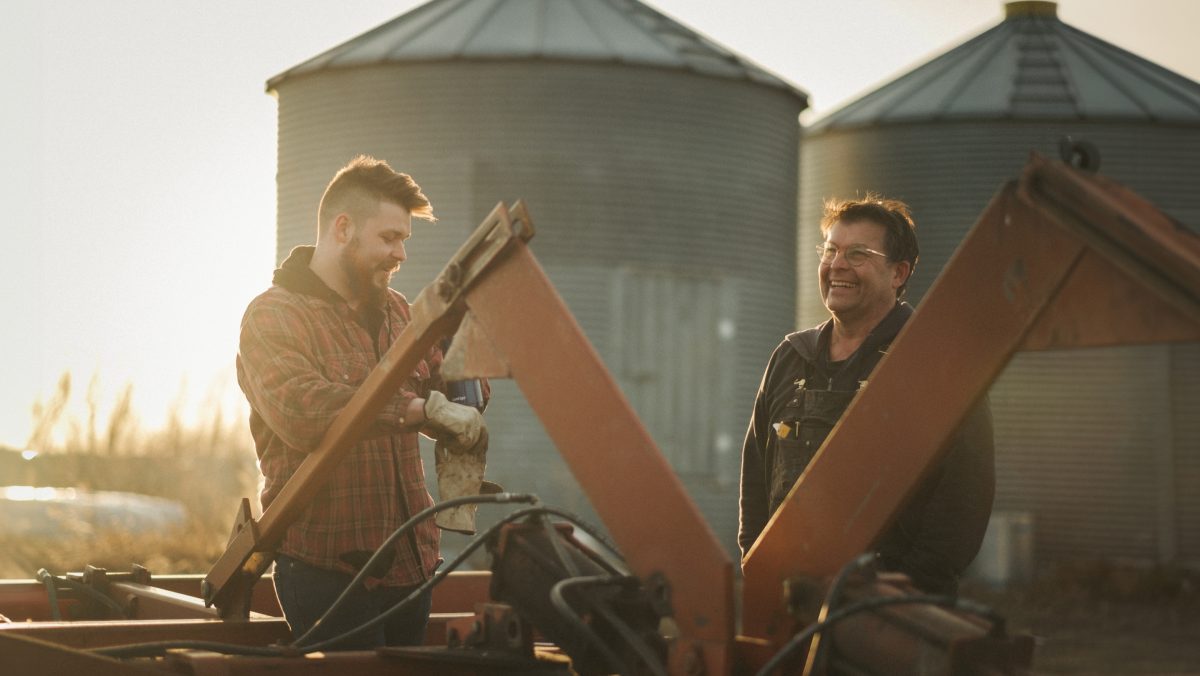
Type: On the farm

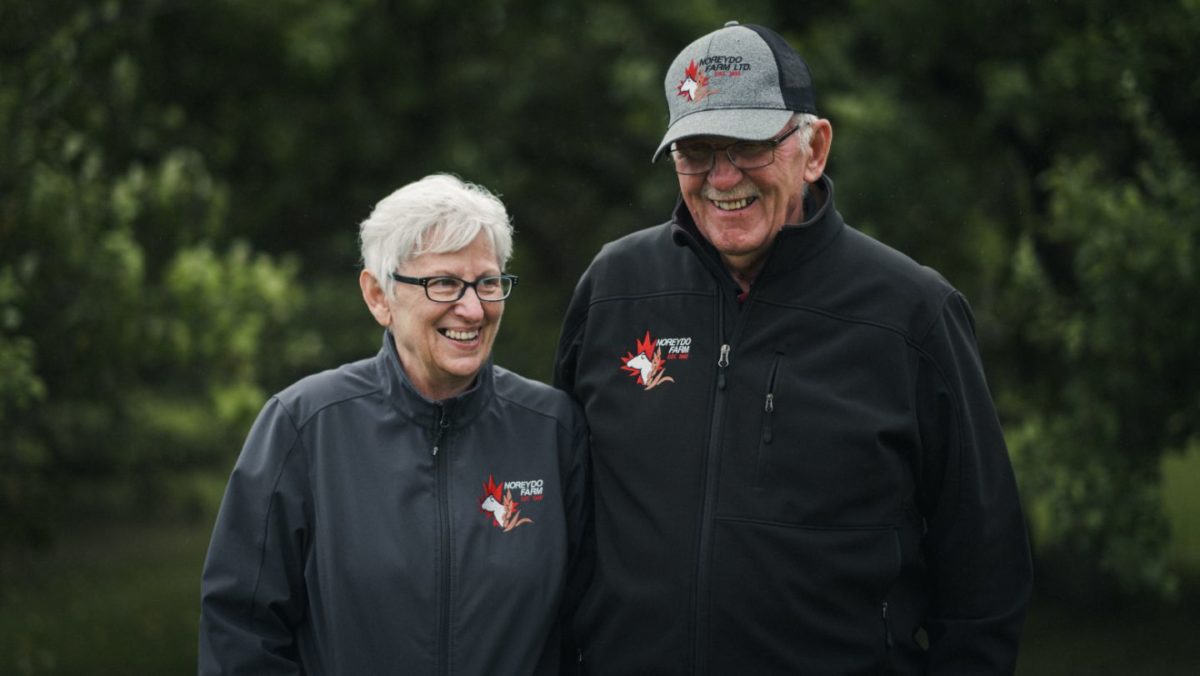
Alongside his seven siblings, Norbert Rey was raised on a family farm in St. Claude, Manitoba. His father had been raised in an orphanage since the age of 9 and working on a dairy farm for room and board before moving to St. Claude where he met and settled with Norbert’s mother. “I had an uncle there who owned the Portage creamery in Portage la Prairie for a number of years,” Norbert explains, furthering the context of his dairy farming lineage.
In 1978, Norbert married his wife Donna, and two years later, they built their first dairy barn together and created what is now known as Noreydo Dairy Farm. The name was born out of a combination of the names Norbert, Donna, and Rey.
“We milked 17 cows for our first milking in November when our firstborn, Kevin, was 9 months old,” says Norbert. Their other children – Krista, Ryan, and Shari – were born in 1981, 1986, and 1989. As the kids grew older, they began to help on the farm alongside their after-school involvements with hockey and music. “Over the years, whenever Donna and I would be milking, the kids would play in the middle of the barn. We made a ‘playpen’ with hay bales.”
Over the years, Norbert and Donna increased their herd to 50 cows, and then worked with their sons, Kevin and Ryan, to continue to grow their farm. “In 2010, we added a new barn and milk house. Presently, we milk 90-100 cows and crop 1,000 acres plus rented land. We do this with one employee and family help.”
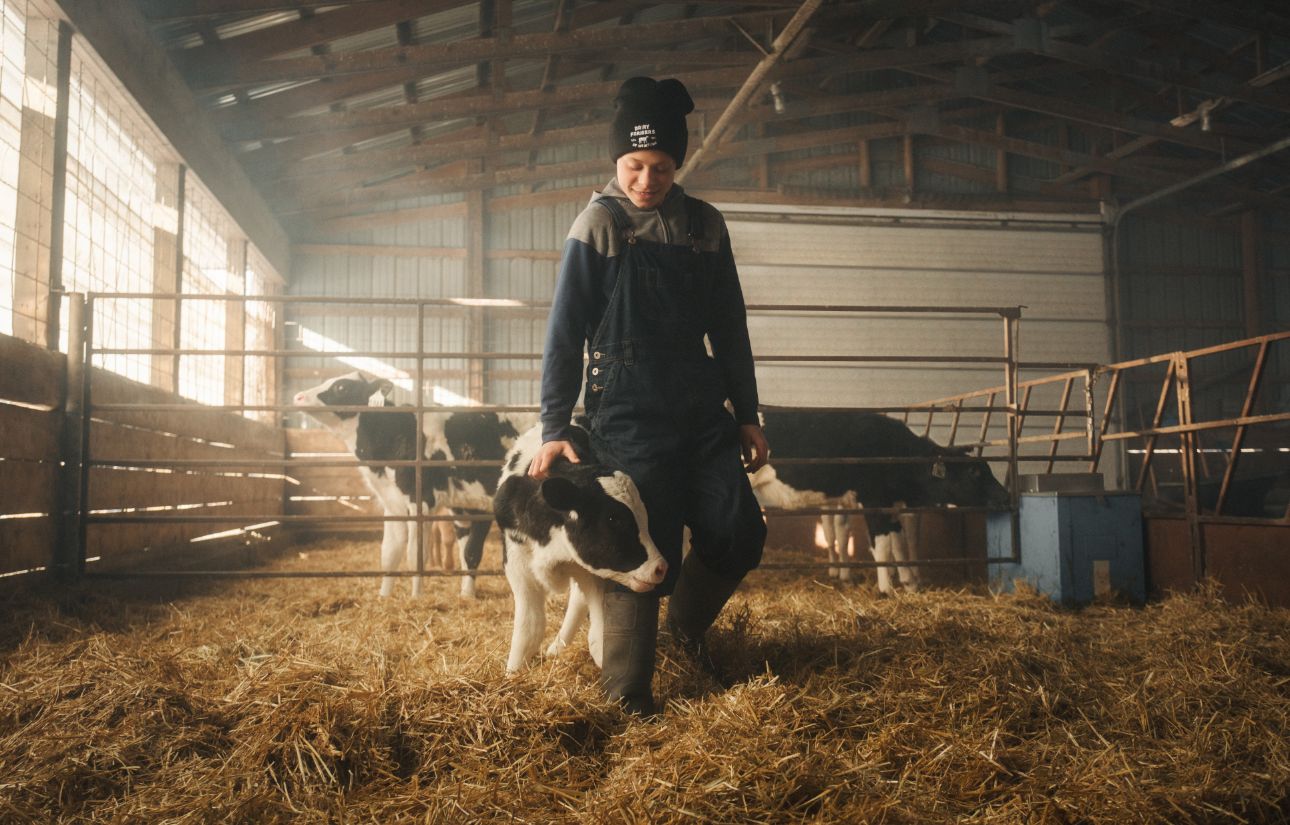
“The children learn how to work
and be responsible. They can see
the results of their work, but they
also learn they can have fun too.”
Their son Kevin and his wife Lisa now have 3 children—Owen, Kali, and Liam. They help with milking, feeding calves, yard work, and any other farm chores. Ryan and his wife Micheline have 3 children as well—Eli, Taryn, and little Sadie. “They also help around the barn by feeding calves and whatever other chores they can manage,” Norbert explains proudly. “And when they’re not helping here, Owen, Kali, and Liam are involved in hockey. While Eli and Taryn play hockey and baseball.”
In Norbert’s eyes, working on a dairy farm at a young age is an important asset. “They can take what they learn wherever they go and apply it to whatever they want to do. When my kids were small, they would come in the tractor or the combine with me, now the grandkids do. We would sometimes have meals together in the field, something we still do, with the grandkids and everyone! The children learn how to work and be responsible. They can see the results of their work, but they also learn they can have fun too. All in all, a dairy farm is a good place to raise a family!”
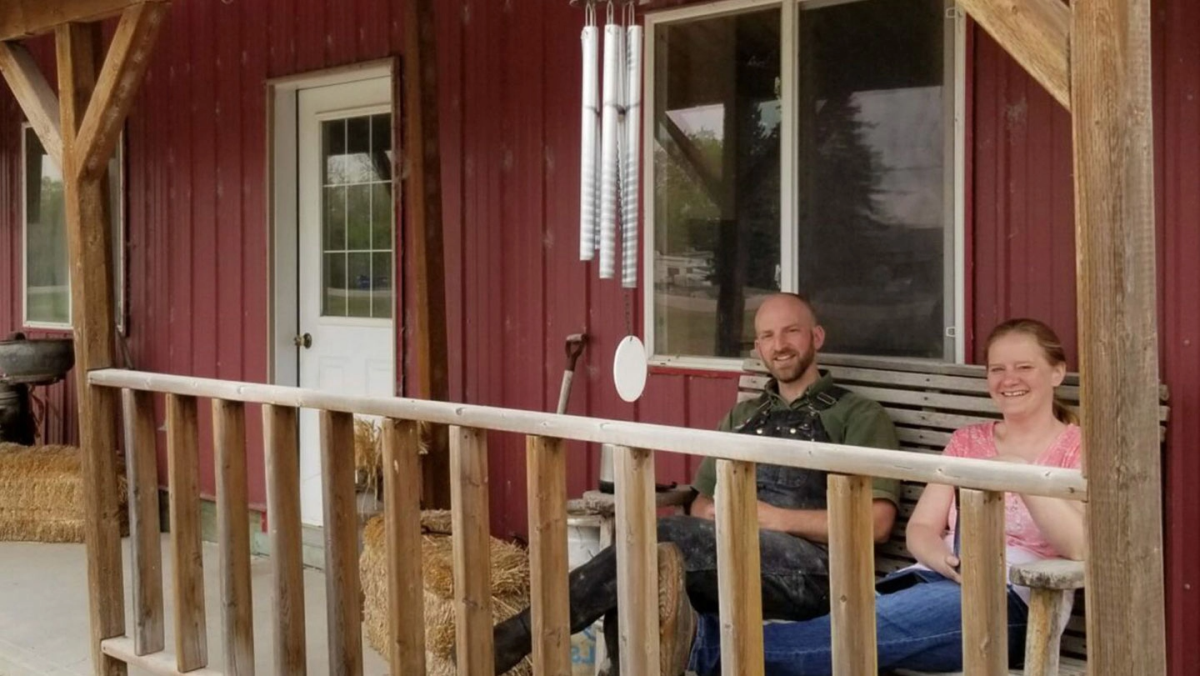
Growing up on a dairy farm in Landmark, Manitoba, Matt Plett had everything he wanted before him—fresh air, family, and a farm. He loved working with animals and being a part of his tight-knit rural community.
However, at 12, his father sold the dairy farm and within a few years the family made a decision to move to the United States. His stepmother had accepted a job as a nurse in Central Point, Oregon – following an American campaign to attract Canadian nurses. So, Plett, who only ever knew Landmark and his farm community, began life anew with his family at age 15.
“It was very challenging,” says Plett, now 40. “I had grown up in the same town my whole life. My baseball team, hockey, Sunday school—it was the same dozen guys and we were all very, very close.”
However, with the benefit of time, Plett did grow to appreciate his two years spent stateside, explaining how it made him grateful in a new way to what his childhood in Manitoba was all about.
“It was good to expand my horizons and see something different and experience different cultures,” he says. “At the same time, my sense of appreciation for time, people, [and] places were heightened.”
And, just as he planned, upon high school graduation, Plett returned to Manitoba and enrolled at the University of Manitoba to study agribusiness and animal science. He quickly landed his first job at Landmark Feeds in 1999.
He had a great job, a romantic relationship, and was back with his childhood friends and family. There was just one nagging void in his life—a farm.
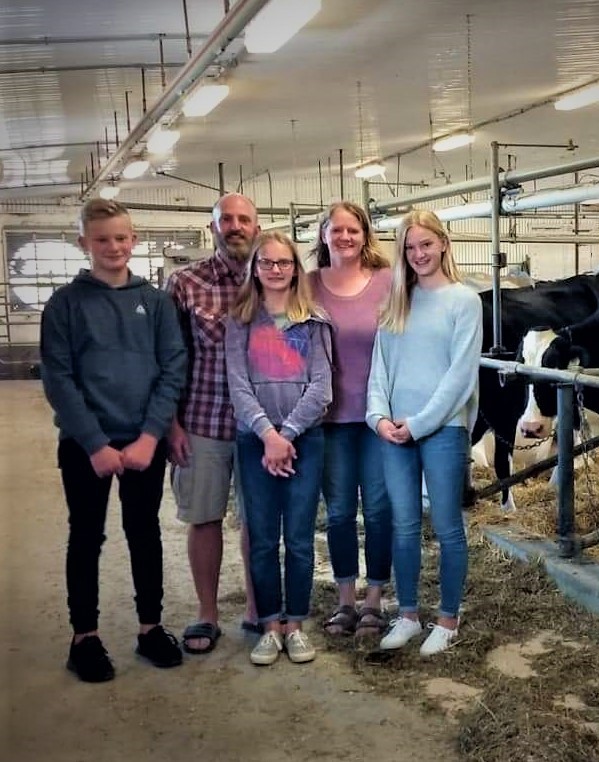
It’s a great way to raise a family and it’s a rewarding way of life
Plett had a secret dream that if his old family farm ever came up for sale, he would buy it back.
Every couple years, Plett stopped in at the farm owner’s property to remind the landowner that should he ever want to sell, there was a buyer all ready.
The benefit of time was on the side of young Plett and, one fall day in 2006, he received a phone call. The owner was approaching his golden years and inquired to see just how serious Plett was. As it turned out, plenty serious. The two worked out equitable terms and made a sale.
Within nine months, Plett and his wife Tanya went from no farm to owning a 45-cow dairy farm. Oh, and they also had their second child during this chaotic period.
“It was a busy season of life, but it all turned out and I’m glad we did it,” says Plett.
Initially, their dairy farm had limited space with limited cash flow. So, their heifer calves (young cows) were sent to another farm to be raised until the Pletts slowly got their feet under them. The family was thriving, and the children were learning all about life on a dairy farm with a 24/7 education.
Another opportunity arose less than five years later as Tanya’s parents offered their nearby dairy farm at Blumenort to their daughter and son-in-law. Although initially not interested, after time spent in conservation with friends and family, they took the plunge.
“But because the opportunity fell in our lap, we felt that maybe that first chapter was done,” says Plett.
The barn setup has allowed them to efficiently produce milk, while continuing to maintain a high level of animal care through three milking sessions each day.
Through farming, Plett is grateful for the opportunity to provide his family with a lifestyle he believes in and where thousands of Canadians can enjoy the fruits of his labour.
“I didn’t look at farming as a get rich quick scheme, because it’s not,” he says with a laugh. “It’s a great way to raise a family and it’s a rewarding way of life. Our work in getting milk to the marketplace is obviously very important and it’s been quite rewarding.”
What Plett finds most rewarding of being a dairy farmer are closely related to the values he holds and ultimately want to pass on to his children, like how a farm is a great place to teach children the value of work, building something, and the value of being productive as a family.
“The fact that farming has been in our families for generations gives our children, and us, a sense of time, place, and purpose. They can see the connection to land and buildings that their ancestors used to make a living, which are still being used by our family today,” he says. “Many of our cow families still descend from a brood cow that my father-in-law purchased 40 years ago. To see the cycle of life from a heifer calf being born, to standing beside her great granddaughter in the barn is a constant reminder that rewarding things take time.”
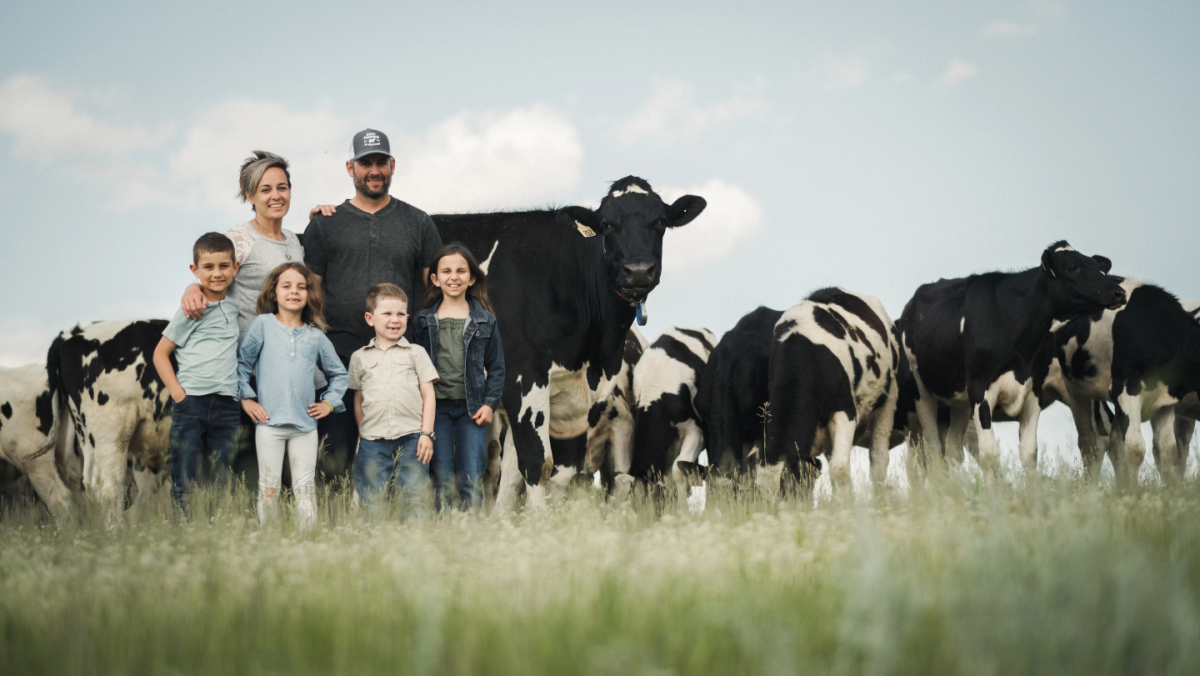
A proud family of 3rd generation farmers run the Mangin Bros. Dairy Farm, which dates back to 1969. It all began with Laurent Mangin who owned 11 milking cows. He passed his humble dairy farm on to his two sons, Rick and Florent, and by 1985, the herd grew from 11 cows to 26. Eventually, the brothers would build an addition to the barn, expanding the herd to 56 cows.
With the next generation taking an interest in dairy farming, Rick and Florent were inspired to grow their farm. Together, they built a new barn in 2003. The first of its kind in the area, the barn incorporated new technology that came with a learning curve, but the Mangin brothers took it in stride. Afterall, a day doesn’t go by when you don’t learn something new on the farm. Because of this, the Mangin family has always valued and prioritized education when it comes to raising the next generation.
After high school, Florent’s son Jamie studied Agribusiness at Assiniboine Community College and took a position as an Agronomist in Shoal Lake. Not a day went by when he didn’t call home to check on his family and the farm.
In January 2008, Jamie returned home to take his place and make his mark on the family farm. That first month back home led Jamie to a new understanding and appreciation for his family’s dedication, love, and passion for the farm. A few years later, his brother Steven followed the same path as his brother – completing his Agribusiness Diploma and spending some time working away. Then in 2011, he returned home to farm alongside Jamie, his parents – Florent & Judy, and his uncle and aunt – Rick & Lucy.
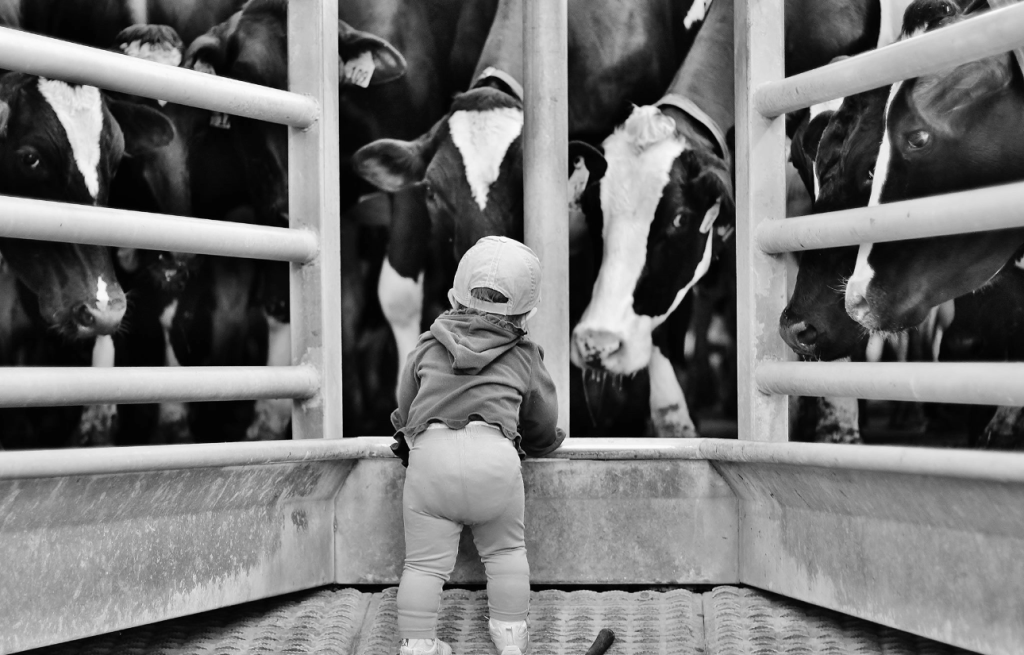
“It’s like getting a chance to relive your childhood watching your children tackle the same chores you did at that age”
When Jamie was in college, he caught the eye of Sheri – a cattle farm girl – and stole her heart. In 2010, they married and a year later they started their family with the arrival of Alivia in 2012, followed by Cole in 2014, Maddison in 2015, and Brayden in 2016. Four children in the span of 4-5 years may sound like a lot, but Jamie & Sheri wouldn’t have it any other way!
Alivia and her siblings can be found in the barn at various times of the day, especially when Grandpa and Grandma (Florent & Judy) are in the barn lending a hand. “Grandma and Grandpa have a special way of making chores fun,” Alivia recalls with a smile. “You’re working and giggling at the same time, and you don’t even know it.”
To Alivia, dairy farming means family – and the farm is where most of her memories are made, just like her dad when he was a child.
“It’s like getting a chance to relive your childhood watching your children tackle the same chores you did at that age,” Jamie reminiscences.
At a young age, Jamie and his siblings learned the ins and outs of a dairy farm. And like everything else, dairy farming comes with good times and hard times.
Always looking for innovative ways to ensure cow comfort, in 2020 Jamie and Steven installed two automated milking systems, which allows cows to choose when and how often they get milked – on average 2 to 3 times a day.
Two years later, the Mangins lost their dairy barn to a devastating fire. Driven by their love of dairy, it took Jamie and Steven less than 24 hours to agree that the only option was to rebuild. “When you’re born into dairy farming, it’s something you can’t shake,” Jamie explains. “I really can’t see myself doing anything else. I knew my heart was in it the first time I remembered my dad taking me to the barn for chores.”
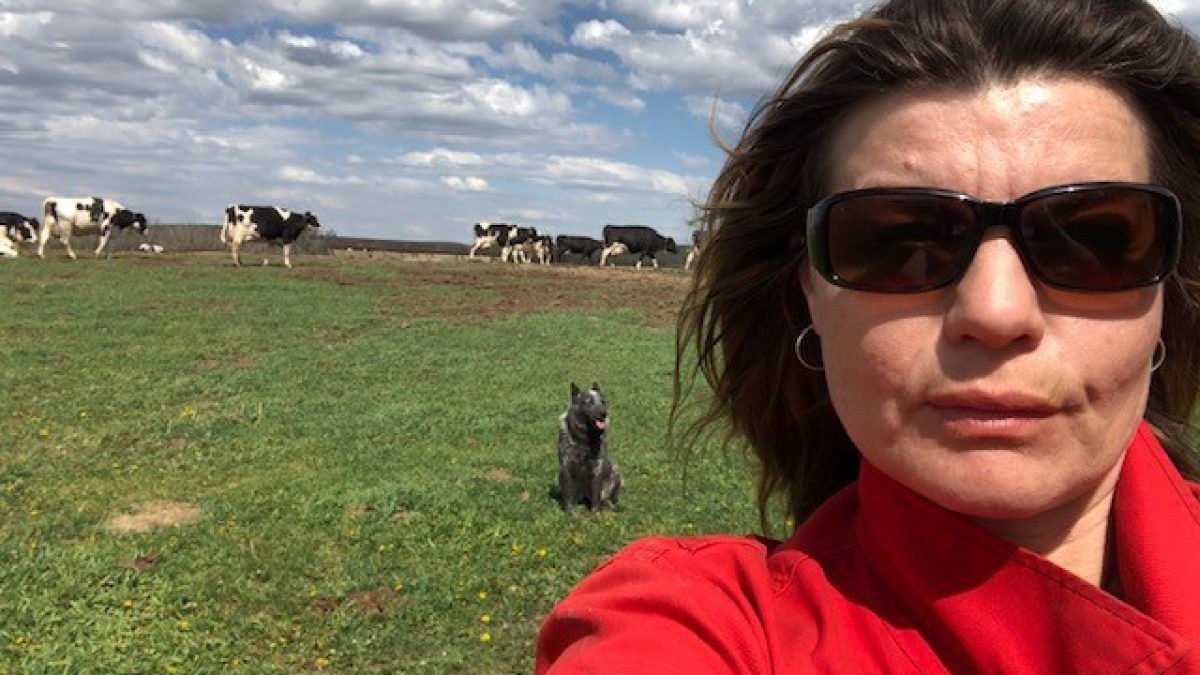
A stone’s throw from Holland, Man., is a quaint 200-herd dairy farm run by sisters Marianne and Isabelle Parvais. Their farm, Parmarisa, is a mashup of their names and a testament that sisters are a mighty force. The pair has worked on the dairy farm since it was formed by their father Raymond, upon relocating to Canada from Halle, Belgium, in 1978.
Marianne Parvais’ passion for dairy farming was instilled at a young age and she took great inspiration from her paternal grandmother Madeleine Lemercier-Parvais, who farmed until age 85.
“She was such a strong woman,” says Parvais. “Her whole life she was independent with her cows.”
Similarly, Parvais took an immediate shine to the dairy world. As a young girl, she would be attached at her father’s hip, completing whatever tasks needed to be accomplished. At night she would verbally translate agricultural newspaper articles into French to him. Non-stop reading instilled a strong business acumen in Parvais early on.
By 13, she knew so confidently dairy farming was her future that she applied to have a share of the family farm. According to Parvais, she is grateful how the dairy industry has afforded her non-stop security and predictability.
“You know what you are working for and delivering,” she says. “I like that stability.”
Despite formative years during the harrowing interest rates of the ‘80s, Parvais remained committed, absorbing everything she could about dairy farming.
“You keep learning every day on a dairy farm,” she adds. “Technology is always changing; it’s an ongoing process and I love learning.”
In 1994, at age 19, she began her own farm with 15 dairy cows near the family farm. That experience gave her the confidence in 2001 to amalgamate with sister Isabelle, who also ran an independent dairy farm. Their biggest technological leap was in 2013 when they acquired two automated milking systems. With these systems in place, cows can come and go to the milking station as they please.
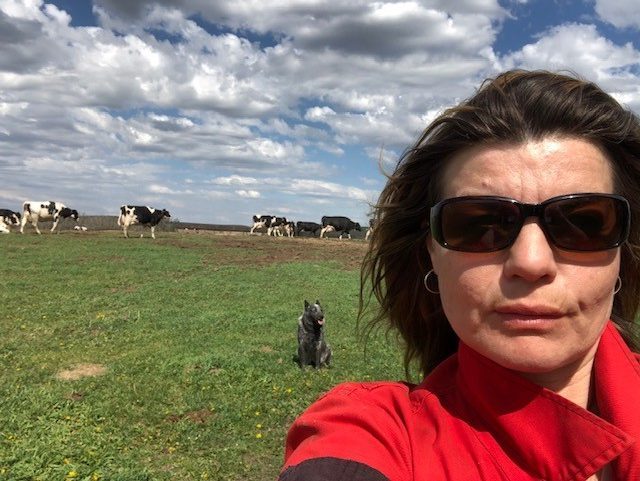
“I thought, ‘there has to be a more efficient way,” says Parvais. “I was a bit scared, and it was such a huge investment. Dad said, ‘I trust your instincts.’ He always believed in me.”
Since then, the farm has added an automated calf feeder – and data is monitored electronically, which helps Parvais with caring for her herd.
Today, married with two children, Parvais takes her role as a mother and leader seriously for her two daughters. As she continues to farm, Parvais knows one day her girls may be the next generation of sisters to operate the dairy farm.
“I’m working so there is a land base ready for them,” she says. “I will be there for my girls, even if they want new technology, just like my dad was there for me.”
Each day as Parvais prepares for her daily chores, she admits with pride how grandma Lemercier-Parvais continues to serve as an ongoing mentor.
“I’m proud to be a dairy farmer and produce a nourishing food for people,” she says. “That’s what keeps me going. I owe it to my grandmother.”
Photos by Marianne Parvais

Kristy-Layne & Richard raise kids and cows on their Manitoba farm. Operating a dairy farm is time consuming work. They milk three times a day, 365 days a year – no exceptions.
Add to that raising four kids who are involved in sports, 4-H and other extra-curricular activities, and these young parents are as busy as it gets.
Learn more about their story and how they balance the needs of a growing family while managing the well-being of their herd, the success of their farm, and their desire to produce the highest quality milk possible.
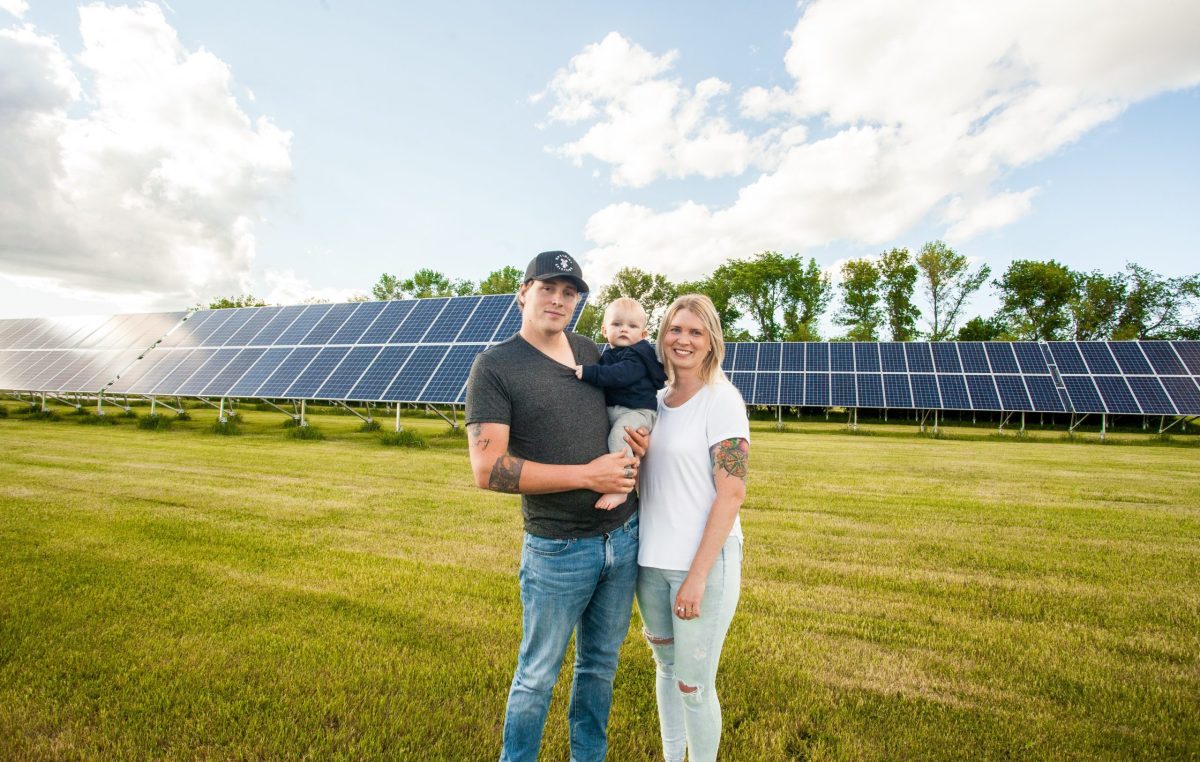
There is no question that farmers, and dairy farmers especially, are passionate about the animals in their care and making a living from the land. That passion extends to making sure that land is sustainable for future generations.
So, when Manitoba Hydro’s Power Smart Solar Energy Program provided an opportunity to pilot a large solar energy project, Optimist Holsteins leapt at the chance.
Within months of applying for the program, the 130-cow family-owned dairy farm near Otterburne – a farming community 50 km south of Winnipeg – flipped the switch on 540 solar panels with a capacity to produce 175 kilowatts (kw) of electric power per hour. They made history by becoming the first dairy farming solar energy project of its size in Manitoba.
Albert Gorter and Chelsea Enns
“The decision to move to solar technology was an easy one for us,” remarks Hans Gorter, who farms with his wife Nelleke, son Albert, and daughter-in-law Chelsea. “As farmers we are in tune with the land so it’s natural to implement sustainable operating systems when and where we can.”
Solar energy is a sustainable resource that is easy to access and creates very little carbon footprint to produce. It’s a clean form of energy that is renewable at no extra cost for the life of the solar panels, which can be up to 25 years.
Optimist Holsteins’ solar energy system sits on land that was only good for growing grass. Two and a half years later that space is now among the most productive pieces of land they own.
“The farm on average will use about 1,000 kilowatt hours (kWh) or more every day. The average solar production is around 750 kWh daily, year-round, which is equal to about 75 or 80 percent of our electricity needs,” explains Gorter. To put that in perspective, the average home in Manitoba uses less than 2,500 kWh of energy every month.
Optimist Holsteins’ environmental leanings are also influenced by Gorter’s European roots. Gorter and his wife moved to Canada from the Netherlands in 1987. He has many friends in Europe who use solar technology.
Optimist Holsteins’ system uses the same type of panels as many of Gorter’s European farming friends – but here in Manitoba, he is getting 20 percent more solar production.
“On average, we in Manitoba have more bright sunny days, making Manitoba an ideal place for solar energy systems,” Gorter adds.
While they aren’t the largest solar energy system in the province anymore, Optimist Holsteins is looking forward to the next big movement in solar technology – the day when solar-powered cars will be the norm and it’s their plan to be the first farm in their area to own one.
Photos by Cric Studios.
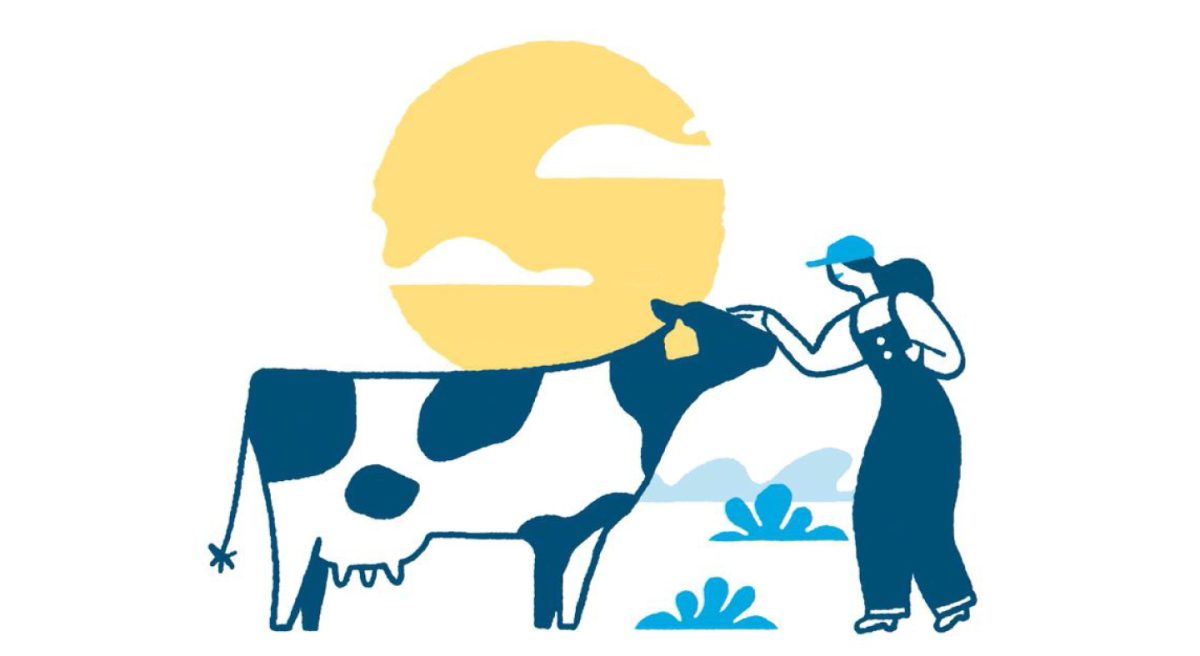
Our dairy farmers take great pride in providing Canadians with safe, high quality milk. Starting on the farm and ending at the grocery store, see the journey milk takes!
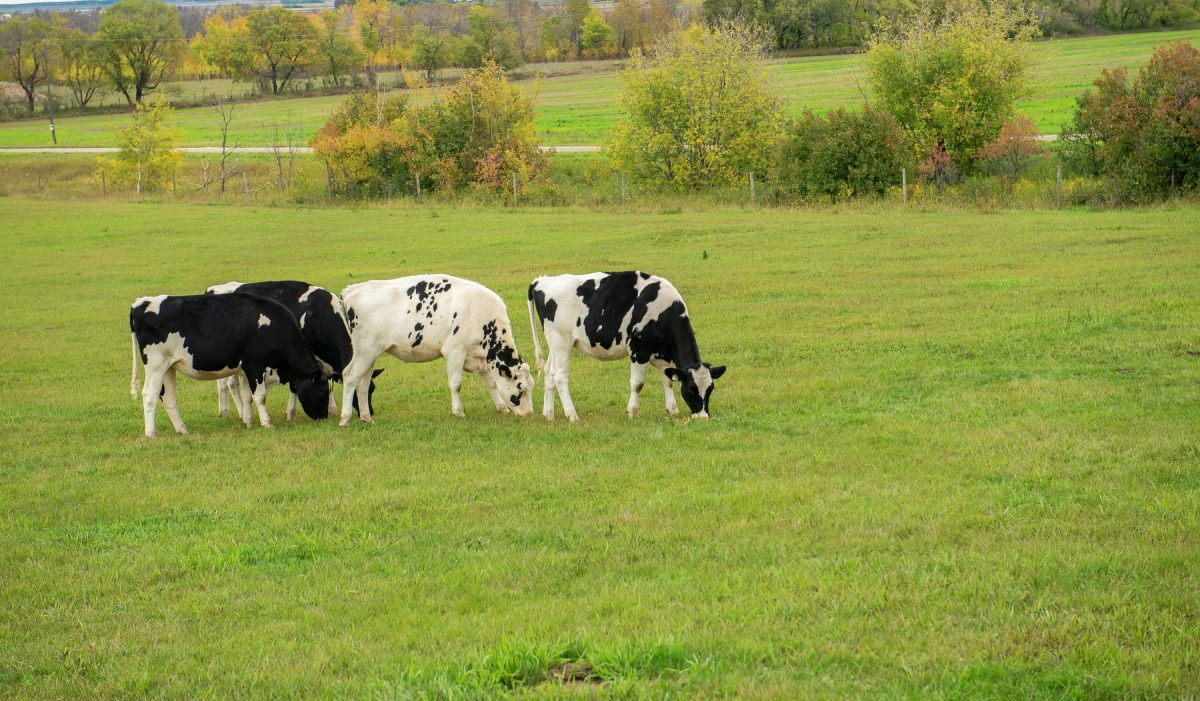
Many of us spend our entire life wondering what we will be when we grow up. Not Owen Fijala, though. The young man from Manitou loves rural life and all that it affords.
He knew early on that agriculture was his life’s calling. However, which area of the industry did not become clear until his teenage years.
He grew up working on the family grain farm before he ventured out as a teen at a neighbouring cattle farm. Following this, his third agricultural experience proved lucky as he began to work at a nearby dairy farm in Notre Dame at just 16. He immediately fell in love with the animals and the work.
“I just enjoyed it right from the beginning and continued to enjoy it more and more,” says Fijala, now 20. “It is very challenging and interesting to continue to learn about herd health.”
It did not take long for Fijala to begin to aspire to have a dairy farm of his own. Luckily, Dairy Farmers of Manitoba (DFM) is keen to invest in those interested in pursuing dairy farming. Fijala applied to DFM’s new entrant program in the fall of 2017, a springboard to help Manitobans become part of the dairy industry. Fijala proved to the board of directors why he would be a great candidate to begin a dairy farm, and it did not take long for the board to sense his passion and green light the application and thorough business plan.
To help him as he began his journey into dairy farming, DFM matched his milk production allocation.
Fijala now has 55 cows on his farm, which are a mixture of young and mature. Today, his cows all produce milk on a predictable, routine schedule.
For Fijala, working on his dairy farm and helping with his family’s grain farm keeps the young entrepreneur busy from dawn ‘til dusk. The barn itself is also high-tech, as cows are milked in an automated system, which allows cows to come and go to the milking station as they please.
Fijala has long-term plans to double the size of his herd and add a second automated milking system.
He enjoys being in the community, as well, and recently participated in the Agriculture in the Classroom – Manitoba program, where he spoke with children at the Manitou Elementary School about dairy farms.
“I got to go in and talk to all the students about how the operations work and how cows are taken care of and the quality of milk,” he says.
Thanks to the new entrant program, Fijala is excited to be part of an industry that places a high priority on animal care and producing high quality milk for Canadians.
